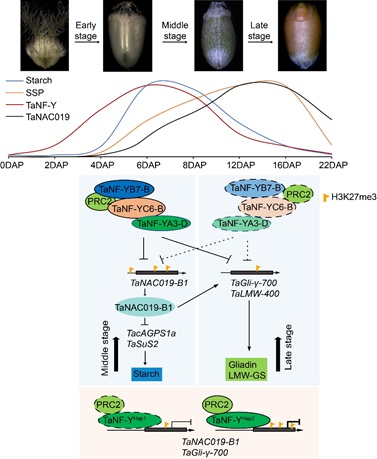
Breeding efforts have focused intensively on improving grain yield and quality in wheat (Triticum aestivum L.). Content and composition of grain starch and seed storage protein (SSP) are two critical factors that determine grain yield and quality. Starch content is closely related to grain weight, while SSP content and composition directly affect the quality of flour. However, there is often a negative correlation between SSP content (quality) and starch content (grain yield).
Recently, the research group of XIAO Jun at the Institute of Genetics and Developmental Biology of the Chinese Academy of Sciences, identified a trimer complex, TaNF-Y, which can simultaneously regulate the biosynthesis of starch and SSP.
Previous studies have reported on the transcriptional regulation of wheat SSP-encoding genes and starch biosynthetic enzyme-encoding genes. However, little is known about how transcription factors regulate both SSP and starch accumulation and coordinate the balance between quality and yield.
TaNF-Y includes TaNF-YA3-D, TaNF-YB7-B, and TaNF-YC6-B. These trimer complex directly or indirectly regulate the synthesis of SSP and starch by changing their own transcription patterns.
“A decrease in starch content and an increase in storage protein content were observed after silencing the TaNF-YA3 and TaNF-YC6 genes using RNAi interference technology,” said Professor XIAO Jun.
Further analysis found that the TaNF-Y trimer complex interacts with Polycomb Repressive Complexes 2 (PRC2), recruiting histone H3K27me3 modifications and inhibit the transcription of SSP-encoding genes TaLMW-400 and TaGli-γ-700, as well as a negative regulator of starch-encoding genes, TaNAC019. In this way, it directly regulates wheat SSP and indirectly regulates starch accumulation.
In addition, natural variations in the coding region of TaNF-YB7-B affect its interaction with PRC2, with the haplotype TaNF-YB7-BHap2 showing higher starch contents and lower SSP contents. This has been positively selected during the breeding process, consistent with the goal of enhancing yield in China's breeding process.
The research results were published online on September 18, 2024, in The Plant Cell with the title "NUCLEAR FACTOR-Y-POLYCOMB REPRESSIVE COMPLEX2 dynamically orchestrates starch and seed storage protein biosynthesis in wheat".
The study was funded by the Chinese Academy of Sciences' Pioneer A Special Project, the National Key Research and Development Program of China, the National Natural Science Foundation of China, and the Beijing Natural Sciences Foundation Outstanding Youth Project.


86-10-68597521 (day)
86-10-68597289 (night)

52 Sanlihe Rd., Xicheng District,
Beijing, China (100864)

